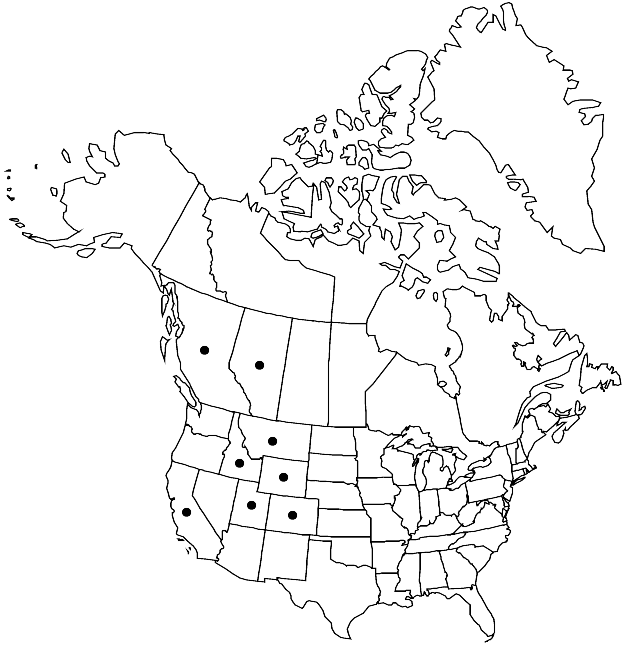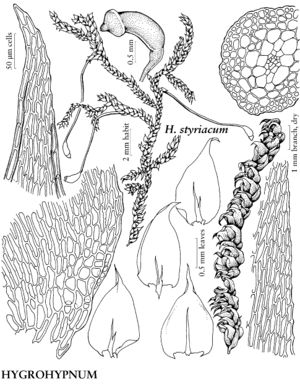Difference between revisions of "Hygrohypnum styriacum"
in H. G. A. Engler and K. Prantl, Nat. Pflanzenfam. 231[I,3]: 1039. 1908.
FNA>Volume Importer |
FNA>Volume Importer |
||
| Line 9: | Line 9: | ||
|special_status={{Treatment/ID/Special_status | |special_status={{Treatment/ID/Special_status | ||
|code=F | |code=F | ||
| − | |label= | + | |label=Illustrated |
}} | }} | ||
|basionyms={{Treatment/ID/Basionym | |basionyms={{Treatment/ID/Basionym | ||
|name=Hypnum styriacum | |name=Hypnum styriacum | ||
|authority=Limpricht | |authority=Limpricht | ||
| + | |rank=species | ||
|publication_title=Flora | |publication_title=Flora | ||
|publication_place=65: 201. 1882 | |publication_place=65: 201. 1882 | ||
| Line 20: | Line 21: | ||
|name=Eurhynchium styriacum | |name=Eurhynchium styriacum | ||
|authority=(Limpricht) Kindberg | |authority=(Limpricht) Kindberg | ||
| + | |rank=species | ||
}} | }} | ||
|hierarchy=Amblystegiaceae;Hygrohypnum;Hygrohypnum styriacum | |hierarchy=Amblystegiaceae;Hygrohypnum;Hygrohypnum styriacum | ||
| Line 43: | Line 45: | ||
-->{{#Taxon: | -->{{#Taxon: | ||
name=Hygrohypnum styriacum | name=Hygrohypnum styriacum | ||
| − | |||
|authority=(Limpricht) Brotherus in H. G. A. Engler and K. Prantl | |authority=(Limpricht) Brotherus in H. G. A. Engler and K. Prantl | ||
|rank=species | |rank=species | ||
| Line 56: | Line 57: | ||
|publication title=in H. G. A. Engler and K. Prantl, Nat. Pflanzenfam. | |publication title=in H. G. A. Engler and K. Prantl, Nat. Pflanzenfam. | ||
|publication year=1908 | |publication year=1908 | ||
| − | |special status= | + | |special status=Illustrated |
| − | |source xml=https://jpend@bitbucket.org/aafc-mbb/fna-data-curation.git/src/ | + | |source xml=https://jpend@bitbucket.org/aafc-mbb/fna-data-curation.git/src/f50eec43f223ca0e34566be0b046453a0960e173/coarse_grained_fna_xml/V28/V28_437.xml |
|genus=Hygrohypnum | |genus=Hygrohypnum | ||
|species=Hygrohypnum styriacum | |species=Hygrohypnum styriacum | ||
Revision as of 21:14, 16 December 2019
Plants soft to slightly rigid, dull yellow-green with rusty mottling, less often dirty brownish yellow or uniformly dull green. Stems to 6 cm, leafy throughout or denuded in older extremities, irregularly branched; hyalodermis absent, epidermal cells small, walls thick, similar to subadjacent cortical cells, central strand strong. Leaves often weakly imbricate, straight or falcate, shrinking laterally and twisting apically or spreading when dry, spreading and broadly concave when moist, ovate, concave, (0.7–)1–1.8(–2) × (0.3–)0.5–1(–1.1) mm; margins plane, entire; apex abruptly acuminate, less often gradually so; costa double, single, or 2-fid, strong, thick, short, infrequently single beyond mid leaf; alar cells few, quadrate or short-rectangular, region grading imperceptibly into basal or proximal medial cells or undifferentiated; basal laminal cells slightly wider than medial cells; medial cells usually short, variously rhombic, short-fusiform, or bacilliform, (18–)28–40(–50) × (4–)5–7(–9) µm; apical cells similar or shorter; marginal cells rarely longer than 55 µm. Sexual condition autoicous; 1 perigonium situated immediately beside 1 perichaetium or between 2–4 perichaetia, perigonial-perichaetial complex enclosed within 2 or 3 small bracts in leaf axils, perichaetial inner leaves lanceolate. Seta reddish yellow to red, 0.9–2.1 cm. Capsule with endostome cilia 2 or 3.
Habitat: Irrigated, emergent acidic rock in montane streams
Elevation: high elevations (2000-3700 m)
Distribution

Alta., B.C., Calif., Colo., Idaho, Mont., Utah, Wyo., Europe.
Discussion
Hygrohypnum styriacum is distinctive but sometimes mistaken for small, falcate-leaved forms of H. luridum. The two species are sympatric in western North America. Leaves of H. styriacum are ovate to slightly broadly so, with an abruptly acuminate apex. Leaves of small, falcate-leaved specimens of H. luridum taper gradually to an acute apex from an ovate or oblong-lanceolate base. The costa of H. styriacum is subtly slightly stouter than that of H. luridum. All leaves of H. luridum have a well-developed region of quadrate, short-rectangular, or irregular alar cells; alar regions of H. styriacum are undifferentiated or composed of few quadrate or short-rectangular to irregular cells that grade imperceptibly into adjacent cells. A differentiated annulus may be found upon lifting the operculum of H. styriacum, while such an annulus is absent in H. luridum.
Selected References
None.
